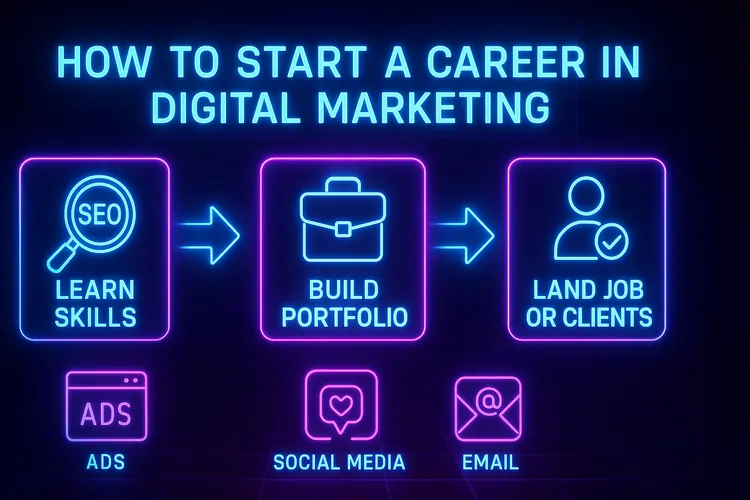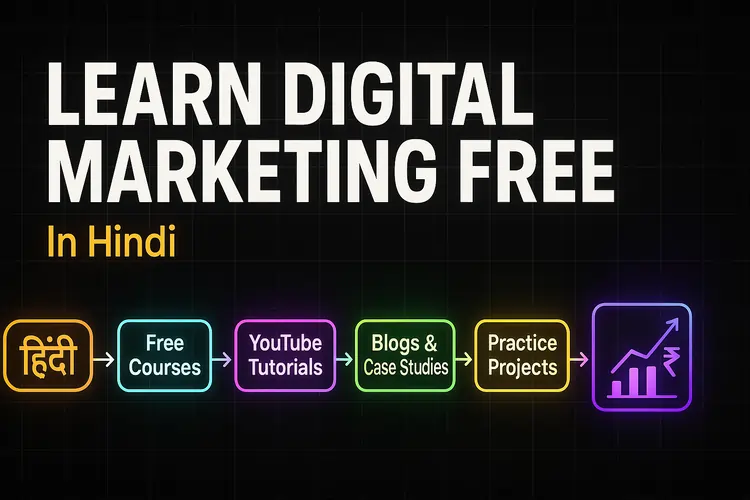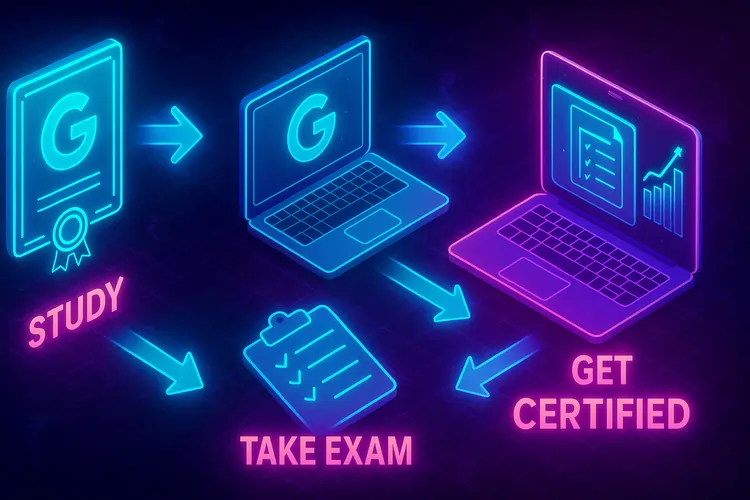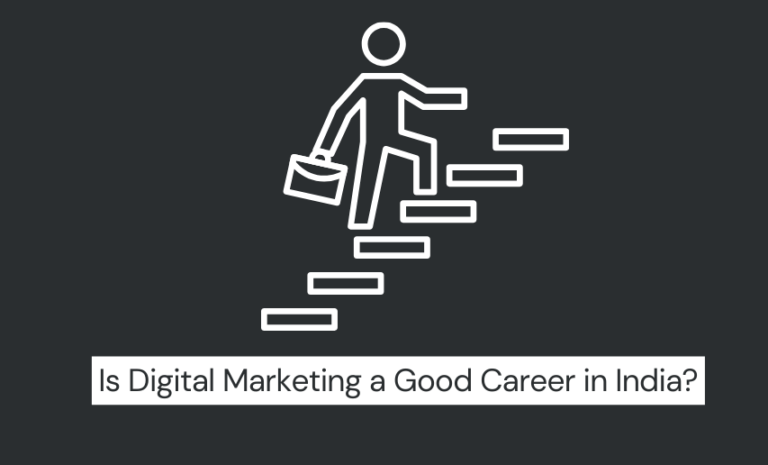How to start a career in digital marketing is one of the most searched topics today.
With more businesses going online, the demand for skilled marketers has exploded.
This guide gives you a clear, step-by-step path to enter the industry.
It covers skills, tools, jobs, and strategies for success in 2025 and beyond.
We’ll keep it simple and practical.
No fluff — only proven steps from The DM School’s real-world experience.

The right skills can get you hired or help you start your own business.
What is Digital Marketing?
Digital marketing is promoting products or services using the internet.
It helps brands reach and convert customers online.
It includes SEO, PPC ads, social media marketing, email campaigns, and content creation.
These channels work together to attract and engage the right audience.
If you want to start a career in digital marketing, first understand these channels.
This knowledge shapes your learning and career choices.
Digital marketing works because it connects the right message to the right person at the right time.
Why Digital Marketing is a Great Career in 2025
The demand for digital marketing professionals is at an all-time high.
Companies in every industry are competing for online visibility.
From startups to global brands, every business needs marketers who can attract, engage, and convert customers in the digital space.
If you start a career in digital marketing now, you enter a fast-growing industry with multiple career paths, remote work options, and high earning potential.
📈 Key Growth Stats:
- Global digital ad spend will cross $900 billion by 2027.
- SEO, PPC, and social media roles are among the top 10 fastest-growing jobs.
- Freelancers in digital marketing can earn ₹50,000 to ₹2 lakh per month.
Digital marketing also offers flexibility — you can work for a company, join an agency like The DM School, or start your own business.
In 2025, digital marketing is not just a career choice — it’s a gateway to financial independence.
Key Skills Needed to Start a Career in Digital Marketing
You need skills that drive revenue.
Each skill below includes a goal, actions, tools, KPIs, and a practice task.
1) SEO That Ranks and Converts
- Goal: Rank pages that bring buyers.
- Do this: Map intent. Target one keyword per page.
- Use internal links to pass authority.
- Tools: GSC, GA4, Sheets, any crawler.
- KPIs: Impressions, CTR, top‑3 ranks, leads.
- Practice: Optimize one page using these SEO tips.
- Pitfall: Chasing volume. Ignore weak intent.
- Next: Read our SEO guide.
2) Google Ads & PPC Systems
- Goal: Leads under target CPL.
- Do this: Group exact intent. Use SKAG‑lite.
- Match ad, keyword, and page tightly.
- Tools: Google Ads, Editor, GA4, Looker.
- KPIs: CPL, CVR, QS, search terms fit.
- Practice: Launch one search campaign. Then apply this ROI checklist.
- Pitfall: Broad match with weak negatives.
- Next: Learn from our Google Partner PPC playbook.
3) Facebook & Instagram Ads
- Goal: Cold interest to booked calls.
- Do this: Hook, proof, offer, CTA.
- Use 3 creatives. Test one variable at a time.
- Tools: Ads Manager, Library, Sheets.
- KPIs: CTR link, CPL, thumb‑stop rate.
- Practice: Replicate a funnel from our Facebook ads framework.
- Pitfall: Scaling before message‑fit.
- Next: Study this targeting strategy.
4) YouTube Ads & Video Funnels
- Goal: Demand capture with intent video.
- Do this: 5‑second hook. Show proof fast.
- Use in‑market + keyword targeting.
- Tools: Google Ads, YT Studio.
- KPIs: View rate, CPV, leads, CAC.
- Practice: Follow our YouTube ads guide.
- Pitfall: Long intros. Weak offer.
- Proof: See our YT results.
5) Content & Direct‑Response Copy
- Goal: Content that sells, not just ranks.
- Do this: Lead with pain. Deliver proof.
- End with one clear CTA.
- Tools: Docs, Sheets, Grammarly.
- KPIs: Time on page, clicks, leads.
- Practice: Publish weekly on your blog.
- Pitfall: Vague claims. No numbers.
- Next: Study our strategy posts.
6) Analytics, Reporting & Finance
- Goal: Tie spend to profit.
- Do this: Track CPL, CAC, LTV weekly.
- Report wins, losses, and next actions.
- Tools: GA4, Looker, Sheets.
- KPIs: CAC payback, MER, ROAS.
- Practice: Build a one‑page KPI sheet.
- Pitfall: Vanity metrics. No decisions.
- Next: Compare with our ad process.
7) Landing Pages & CRO
- Goal: Turn clicks into leads.
- Do this: One offer. One action.
- Fast load. Social proof above fold.
- Tools: Page builders, Hotjar, VWO.
- KPIs: CVR, bounce, form completion.
- Practice: Test two headlines this week.
- Pitfall: Busy pages. Weak clarity.
- Next: Read our funnel guide.
8) Email Marketing & Automation
- Goal: Nurture and close.
- Do this: Send proof‑led sequences.
- Segment by behavior and value.
- Tools: Any ESP, Sheets, webhook tools.
- KPIs: Open, CTR, reply, revenue.
- Practice: Draft a 5‑email welcome flow.
- Pitfall: Daily blasts. No intent.
- Next: Pair with our services.
9) Local SEO & Reputation
10) Strategy, Funnels & Ops
- Goal: Predictable pipeline growth.
- Do this: Map TOFU, MOFU, BOFU.
- Align offers, pages, and follow‑ups.
- Tools: Whiteboard, Sheets, CRM.
- KPIs: Lead velocity, SQL rate, CAC.
- Practice: Build a 90‑day plan.
- Pitfall: Many offers. No focus.
- Next: Study our ad process.
Key Skills Needed to Start a Career in Digital Marketing
To start a digital marketing career in 2025, you need a mix of technical expertise, creative ability, and analytical thinking.
These skills allow you to create campaigns that attract the right audience and turn them into paying customers.
Unlike traditional marketing, digital marketing changes fast. Search engine algorithms, ad platforms, and consumer behaviors evolve almost monthly.
That’s why your skill set must cover both the fundamentals and the latest trends.
📊 Search Engine Optimization (SEO) & Search Engine Marketing (SEM)
SEO ensures your website ranks high for relevant keywords, driving free organic traffic.
This includes keyword research, on-page optimization, technical SEO, and link building.
SEM, on the other hand, focuses on paid search ads (Google Ads, Bing Ads) to instantly appear for high-intent searches.
For example, at The DM School, we’ve ranked client sites for competitive terms and reduced ad CPCs by over 30% through better targeting.
💬 Social Media Marketing
Platforms like Facebook, Instagram, LinkedIn, and YouTube are essential for building brand visibility.
A skilled social media marketer knows how to use organic posts, paid ads, influencer partnerships, and analytics to drive growth.
The key is understanding platform algorithms, crafting platform-specific content, and leveraging retargeting campaigns to re-engage past visitors.
✍️ Content Marketing
Content is the backbone of digital marketing.
This includes blogs, videos, podcasts, infographics, and case studies that attract and educate your audience.
Effective content marketing follows a strategy — researching topics your audience cares about, optimizing for SEO, and distributing through the right channels.
📧 Email Marketing
Email remains one of the highest-ROI channels in digital marketing.
You need skills in list building, segmentation, copywriting, and automation to nurture leads and convert them into buyers.
A/B testing subject lines and tracking open rates, CTR, and conversions are essential for improving results.
📈 Analytics & Data Interpretation
Data tells you what’s working and what’s not.
You must know how to use tools like Google Analytics, Google Tag Manager, and Facebook Pixel to track user behavior.
By analyzing data, you can make decisions that lower costs and increase ROI.
Step-by-Step Plan to Start Your Career in Digital Marketing
If you want to start a career in digital marketing, you need a roadmap.
Random learning leads to confusion, but a structured plan ensures you become job-ready faster.
1️⃣ Learn the Basics
Start with core concepts like SEO, social media marketing, paid ads, content creation, and analytics.
Free resources (Google Digital Garage, HubSpot Academy) are great, but a structured course from a trusted institute like The DM School accelerates your growth.
2️⃣ Pick a Specialization
Digital marketing is broad. Choose one area (SEO, PPC, content marketing, or social media) to master first.
This makes you stand out and land better-paying roles faster.
3️⃣ Build Hands-On Experience
Theory isn’t enough. Create your own website or work on live campaigns.
Use Google Ads credits, run social media pages, and test SEO strategies to build a portfolio.
4️⃣ Master the Tools
Learn platforms like Google Analytics, SEMrush, Meta Ads Manager, Canva, and Mailchimp.
Employers value candidates who can start using tools without training.
5️⃣ Create a Strong Online Presence
Build a LinkedIn profile showcasing your skills, certifications, and portfolio.
Publish content regularly to position yourself as an expert.
6️⃣ Apply for Internships & Entry-Level Roles
Gain real industry exposure by working with agencies, startups, or freelancing.
This adds credibility to your profile and helps you learn client communication.
7️⃣ Keep Learning & Networking
Join webinars, attend marketing events, and connect with industry leaders.
Digital marketing changes fast — your learning never stops.
Common Mistakes Beginners Make in Digital Marketing (and How to Avoid Them)
Most beginners think digital marketing is just posting on social media.
That’s why they get stuck with no results and wasted effort.
Here are the biggest mistakes — and how you can skip them to fast-track your success.
❌ Jumping in Without a Strategy
Random posts and ads rarely work.
Fix: Start with a clear goal, target audience, and measurable KPIs.
❌ Trying to Learn Everything at Once
Spreading yourself too thin slows progress.
Fix: Master one area (like SEO or Google Ads) before adding more.
❌ Ignoring Analytics
If you’re not tracking results, you’re marketing blind.
Fix: Use Google Analytics, Facebook Pixel, or similar tools from day one.
❌ Copying Competitors Blindly
What works for them may not work for you.
Fix: Adapt strategies to your audience, budget, and goals.
❌ Avoiding Paid Ads Completely
Organic reach takes time — and often isn’t enough.
Fix: Start with small ad budgets to test and scale faster.
❌ Skipping Networking
Opportunities often come through connections, not job boards.
Fix: Engage in LinkedIn groups, webinars, and industry events.
Slow down, focus, and track your progress — that’s how you win in digital marketing.
How to Land Your First Digital Marketing Job or Client
You have skills. Now turn them into income. Use this simple plan. It works for jobs and clients.
1) Pick Your Positioning
Choose one niche or offer. Example: “Google Ads for local services.”
Create a one‑line pitch and put it on LinkedIn.
2) Build a Proof‑First Portfolio
Show three mini case studies with screenshots and KPIs.
Use our format from case studies and reviews.
3) Win the ATS and the Interview
Mirror keywords from the job post. Keep a clean PDF resume.
Bring one page with recent results and charts.
4) Build a Simple Client Pipeline
Shortlist 30 targets in one niche. Send warm emails weekly.
Offer an audit call. Link two proofs on your blog.
Outreach Email (Copy + Send)
Subject: Quick win for {{Company}} in 14 days
Hi {{Name}},
Spotted {{specific gap}} on {{channel}}.
I help {{niche}} get {{result}} using {{method}}.
Here are two quick wins:
1) {{tactic 1}} → est. {{metric lift}}
2) {{tactic 2}} → est. {{metric lift}}
I can run a free 15‑min audit next week.
Does Tuesday 3 PM work?
— {{Your Name}} | {{1‑line positioning}} | {{Portfolio link}}
5) Run a Tight Discovery Call
Ask budget, target, current CPL, and bottlenecks. Then recap.
Close with a clear next step to a proposal.
6) Send a One‑Page Proposal
Include goal, plan, KPIs, timeline, and price.
Use this as a base: agency proposal.
7) Price With Clarity
Offer two options. Retainer + setup or project fee.
Anchor to value. Quote with confidence.
8) Add Risk Reversal
Offer a short trial or a milestone gate.
Frame it as “prove‑then‑scale.”
9) Follow Up Three Times
Day 2: send a quick value tip. Day 5: send a micro‑audit.
Day 9: share a relevant case study link.
10) Target Local Roles and Clients
Apply by area. Use our location hubs for credibility.
11) Add Proof Everywhere
Link to Google Ads results and
The DM School review.
Post one proof thread weekly on LinkedIn.
✅ Quick Checklist
- One niche. One offer. One line pitch.
- Three proof pages with screenshots.
- Thirty targets. Weekly warm email cadence.
- One‑page proposal with two pricing options.
- Three polite follow‑ups with value.
Want help building this pipeline? Learn our exact process inside these guides:
ad process,
strategy from scratch, and agency proposal.
How to Land Your First Digital Marketing Job or Client
Getting started in digital marketing can feel overwhelming. But with the right approach, you can secure your first job or client faster than you think.
1️⃣ Learn the Basics
Complete a structured digital marketing course covering SEO, ads, content, and analytics. This gives you the foundation to work on real projects.
2️⃣ Build Your Portfolio
Work on mock campaigns or offer free trials to small businesses. Collect screenshots, reports, and results to showcase your skills.
3️⃣ Prepare Your Resume & Portfolio
Use proven templates so you can apply quickly and stand out. Copy and edit these to match your skills.
4️⃣ Apply & Pitch Daily
Apply on job portals like LinkedIn and Indeed. For freelancing, pitch on platforms like Upwork and Fiverr. Consistency beats luck.
📄 Resume Templates (Copy-Paste)
Fresher Resume Template:
Name: [Your Name] Email: [Your Email] Phone: [Your Phone] LinkedIn: [Your Profile] Portfolio: [Portfolio Link] Objective: Entry-level digital marketer with hands-on training in SEO, social media marketing, and Google Ads. Eager to apply skills to real-world projects and deliver measurable results. Skills: - SEO (On-page & Off-page) - Social Media Marketing - Google Ads & Facebook Ads - Content Writing & Email Marketing - Analytics (Google Analytics, Search Console) Projects: - Managed Instagram growth for a local café (from 200 to 2,000 followers in 60 days) - Created and optimized 5 blog posts for an educational website Education: [Degree or Certification]
Experienced Resume Template:
Name: [Your Name] Email: [Your Email] Phone: [Your Phone] LinkedIn: [Your Profile] Portfolio: [Portfolio Link] Summary: Digital marketing professional with [X years] of experience managing SEO, PPC, and social media campaigns. Proven track record of increasing conversions and ROI for clients across industries. Skills: - SEO (Technical, On-page, Off-page) - Paid Ads (Google, Meta, LinkedIn) - Conversion Rate Optimization - Funnel Building & Automation - Copywriting & Content Strategy Experience: [Role] – [Company Name] – [Year-Year] - Increased organic traffic by 75% in 6 months through targeted SEO campaigns. - Managed ₹[X] lakh ad spend with average ROI of [X]%. Education: [Degree or Certification]
🎯 Portfolio Template (Copy-Paste)
Title: [Campaign Name] Client/Industry: [Client Name or Industry] Goal: [Objective of the Campaign] Strategy: [Brief on targeting, creatives, and platforms used] Results: - [Metric 1: e.g., Leads generated: 1,200] - [Metric 2: e.g., Cost per lead: ₹65] - [Metric 3: e.g., ROI: 3.2x]
Freelancing vs Full-Time Jobs in Digital Marketing: Which is Right for You?
When starting a career in digital marketing, one of the biggest decisions is whether to work as a freelancer or take a full-time job. Both paths have unique benefits and challenges, and the right choice depends on your goals, risk tolerance, and lifestyle.
💼 Full-Time Job
- Stable income with predictable monthly pay.
- Structured work environment and team collaboration.
- Employer often provides training, tools, and resources.
- Career growth through promotions and skill-building.
🖥️ Freelancing
- Freedom to choose clients, projects, and working hours.
- Unlimited earning potential based on skill and effort.
- Opportunity to work with international clients.
- No cap on creativity and niche specialization.
📊 Quick Comparison Table
| Factor | Full-Time Job | Freelancing |
|---|---|---|
| Income Stability | High | Variable |
| Work Flexibility | Low | High |
| Learning Curve | Moderate | High |
| Risk Level | Low | Medium to High |
| Earning Potential | Fixed | Unlimited |
💡 Pro Tip
Networking and Personal Branding in Digital Marketing
In the competitive digital marketing industry, your skills matter — but your personal brand and network can be equally powerful. Building strong connections and positioning yourself as a go-to expert increases your chances of landing high-value jobs, freelance clients, and collaborations.
🌐 Why Networking Matters
- Opens doors to unadvertised job opportunities and projects.
- Helps you learn from peers, mentors, and industry leaders.
- Boosts credibility through professional endorsements and referrals.
🧠 Personal Branding Essentials
1. Optimize Your LinkedIn
Use a professional photo, write a keyword-rich headline, and post industry insights regularly.
2. Publish Case Studies
Show proof of results from projects, campaigns, or personal experiments to build trust.
3. Be Active in Communities
Join Facebook groups, Reddit threads, and marketing forums to share value and learn.
📈 Networking Strategies That Work
- Attend webinars, workshops, and conferences to meet industry peers.
- Engage with other marketers’ content by commenting and sharing insights.
- Collaborate on guest posts, podcasts, or joint campaigns to cross-promote.
- Offer free value — templates, tips, or resources — to start relationships.
Step-by-Step Roadmap to Kickstart Your Digital Marketing Career in 90 Days
Breaking into digital marketing doesn’t have to take years. With the right action plan, you can start building skills, a portfolio, and earning opportunities in just three months. Here’s a clear roadmap designed for beginners in India aiming to make a strong start.
📅 0–30 Days: Learn & Build Foundations
- Understand key areas: SEO, Google Ads, Facebook Ads, content marketing, email marketing.
- Take a beginner-friendly digital marketing course (free or paid) to cover all basics.
- Follow top blogs, YouTube channels, and podcasts to stay updated.
- Set up essential tools: Google Analytics, Google Search Console, Canva, Mailchimp.
📅 31–60 Days: Practice & Create Portfolio
- Apply skills by creating your own blog or a mock business project.
- Run small ad campaigns with a limited budget to get hands-on experience.
- Document results with screenshots, metrics, and lessons learned.
- Prepare a digital marketing portfolio showing SEO rankings, ad performance, and content samples.
📅 61–90 Days: Apply & Network
- Start applying for internships, freelance gigs, or entry-level roles.
- Reach out to local businesses offering free/discounted services to build credibility.
- Network with other marketers on LinkedIn and local SEO groups, attend webinars, and join niche communities.
- Refine your resume and portfolio with feedback from peers or mentors.
Your 90-Day Plan is Just the Start — Let’s Accelerate Your Growth
Following this digital marketing career roadmap will get you started. But if you want to fast-track results, skip the trial-and-error phase, and work with proven strategies, you need expert guidance.
At The DM School, we don’t just teach theory — we run real client campaigns that generate crores in ad revenue. Our programs are designed for beginners who want to move quickly from learning to earning.
- AI + Digital Marketing Courses covering SEO, Google Ads, Facebook Ads, and automation.
- Hands-on portfolio projects so you can show results from day one.
- Mentorship from industry experts with real campaign experience.
- Job support, client acquisition training, and local SEO strategies to grow your career or business.


